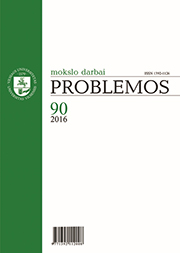FENOMENOLOGINĖS PRIEIGOS PRIE KONTEKSTO PROBLEMA HUSSERLIO PASYVIŲ IR AKTYVIŲ SINTEZIŲ ANALIZĖSE
THE PROBLEM OF PHENOMENOLOGICAL APPROACH TO CONTEXT IN HUSSERL’S ANALYSIS CONCERNING PASSIVE AND ACTIVE SYNTHESIS
Author(s): Ignas ŠatkauskasSubject(s): Contemporary Philosophy, Philosophy of Mind, Philosophy of Language, Methodology and research technology, Phenomenology
Published by: Vilniaus Universiteto Leidykla
Keywords: Husserl; attention; thematization; context;
Summary/Abstract: Current phenomenological research describes attention as three-dimensional structure of theme, context, and margin. It is obvious that attention is no longer conceived as only pertaining to thematizing (focusing, selecting) certain data. In phenomenology of Gurwitsch and its current proponents, attention is given a role of organizing the total field of consciousness. This expansion of the notion of attention in phenomenology brought about the need to describe the dimensions of attentive consciousness beyond the point of focal attention, that is, to focus on the context. The goal of this paper is to show that in phenomenology an attempt to thematize the dimension of context faces a problem: it is impossible to thematize context without making it a theme, that is, no longer having it as the context. This problem, though having major consequences for the theory of attention, has been completely ignored in current phenomenological research on attention. This paper turns to Husserl’s Analysis Concerning Passive and Active Synthesis to find the roots of this problem. It is shown that, in this early stage of phenomenological research of attention, the problem of thematization of context was already evident, but Husserl chose to ignore it, thus bringing about the trend of phenomenological descriptions of contextual attention done without the necessary methodological precision.
Journal: Problemos
- Issue Year: 2016
- Issue No: 90
- Page Range: 82-102
- Page Count: 21
- Language: Lithuanian

